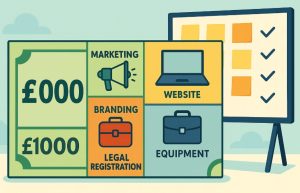Thinking of starting a business but only have £1000 to invest? You’re not alone. Many aspiring entrepreneurs in the UK believe they need a fortune to start, but the truth is quite the opposite. With the right strategy, tools and focus, launching a business with just £1000 is entirely possible.
The UK offers a dynamic startup ecosystem, and numerous low-cost business models can help you get started. Whether it’s offering a skill-based service or setting up a simple e-commerce store, the possibilities are vast if you spend wisely and think strategically. In this guide, we’ll break down the best ways to turn £1000 into a profitable venture, step by step.
Is It Really Possible to Start a Business With £1000 in the UK?
Absolutely. Many small businesses in the UK have launched with less than £1000, proving that success isn’t just about money, it’s about planning, creativity and hustle. From digital services to hands-on physical tasks, a small budget can stretch far if managed properly.
The secret lies in choosing the right business model. Businesses that rely more on skills than inventory or expensive equipment are ideal. Think online tutoring, freelance writing, or setting up a digital marketing service. Thanks to free tools, low-cost websites and networking platforms, getting visibility is no longer a budget-breaker.
With government resources, free banking options and affordable company registration, the legal process is also budget-friendly. Many entrepreneurs now leverage platforms like Wix for websites and Canva for branding, slashing costs while maintaining quality. So yes, £1000 isn’t a barrier. It’s a smart starting point.
What Are the Best Business Ideas Under £1000 in the UK?
You might be surprised by how many profitable businesses you can launch in the UK with £1000 or less. The trick is to focus on ventures with low overheads, where your skills become your biggest asset.
Some smart business ideas under £1000 include:
1. Freelance Services

Freelancing is one of the most accessible ways to start a business with little capital. If you have skills in writing, graphic design, video editing, or web development, you can offer your services on platforms like Fiverr, Upwork, or PeoplePerHour.
All you need is a laptop, internet connection, and a professional profile to begin. Building a portfolio is key, and offering initial work at competitive rates can help you gain traction.
Over time, referrals and reviews will grow your credibility. With zero inventory and no need for a physical space, freelancing is perfect for low-cost self-employment.
2. Tutoring or Coaching

If you have subject expertise or a passion for personal development, tutoring and coaching are great business options. Whether it’s academic tutoring, career mentoring, fitness training, or life coaching, you can deliver sessions online through Zoom or in person.
Startup costs are minimal, usually limited to promotional materials and perhaps a website. You can list your services on platforms like Tutorful or Superprof and reach clients through local social groups. Building client trust and tailoring sessions to individual needs will be key to growing your coaching brand.
3. Cleaning Services

A cleaning service is a practical, in-demand business you can start with basic cleaning supplies and a bit of hustle. Many individuals and businesses in your local area are often seeking reliable cleaners for regular or one-off services.
You can start solo, advertising in local Facebook groups, community boards, or neighbourhood apps like Nextdoor. Once you have a few clients and steady income, you can reinvest in better tools, uniforms, or even hire help. It’s a scalable, recession-resistant business with very low upfront investment.
4. Online Retail and Dropshipping

E-commerce is booming, and you can enter the market without ever touching inventory. Dropshipping allows you to sell products online using platforms like Shopify, with suppliers fulfilling the orders directly.
Alternatively, you can sell handmade or curated goods on Etsy or eBay. The startup costs mostly involve setting up your website, buying a domain, and using design tools like Canva for product images. Success in online retail depends on picking the right niche, strong product descriptions, and clever digital marketing.
5. Blogging or Content Creation

Blogging is a slow-burn but powerful way to build an online business with under £1000. If you’re passionate about a niche topic, travel, finance, health, fashion, you can create a blog using platforms like WordPress.
Monetisation comes through ads, affiliate marketing, or sponsored content once traffic builds. You’ll need a domain name, basic hosting, and time to consistently produce quality content.
For quicker growth, consider video content or start a YouTube channel to diversify your presence. Over time, your audience becomes a valuable asset.
6. Pet Sitting or Dog Walking

The UK is a nation of pet lovers, and busy owners often need help looking after their animals. Pet sitting or dog walking is a low-cost business that requires little more than trustworthiness, time, and a love for animals.
You can register with platforms like Rover or advertise locally. The initial investment might include insurance and simple marketing materials. Word-of-mouth and good reviews can bring steady, repeat customers. As you grow, you might expand into pet grooming or house-sitting services too.
7. Personal Training or Yoga Instruction

If you’re into health and fitness, personal training or yoga classes can be a fulfilling and profitable business. You can train clients in local parks, at their homes, or online via video calls. Start-up costs include certifications, liability insurance, and basic equipment.
Once qualified, advertise through local fitness communities, Instagram, or fitness forums. Offering group classes or bundled sessions can increase your income. As your client base grows, you can even launch fitness programmes or digital workout plans for passive income.
8. Buy and Sell Business

The buy-and-sell model is a flexible way to turn small investments into profit. It involves finding bargains at car boot sales, charity shops, or online marketplaces like Facebook Marketplace, then reselling them at higher prices on platforms like eBay, Depop, or Vinted.
You don’t need a warehouse, just space to store a few items and a good eye for value. Photography and writing solid product descriptions are key to successful selling. With consistent effort, this side hustle can scale into a full-time income.
All of these require minimal capital but demand commitment and resourcefulness. Find a niche you’re passionate about and start lean.
How Should You Allocate Your £1000 Budget Effectively?

Allocating your startup capital smartly is essential for business survival. Every pound should be spent with purpose and a return in mind.
Here’s a suggested table breakdown:
| Expense | Estimated Cost (£) |
| Business registration | 12 |
| Domain and website setup | 100 |
| Logo and branding (DIY/Canva) | 0–50 |
| Initial marketing budget | 50 |
| Equipment or tools | 200–300 |
| Accounting tools or services | 0–100 |
| Miscellaneous/emergency funds | 50–100 |
| Remaining cash buffer | 200–300 |
Spend only on essentials first. For example, use free software like Canva for graphics, and open a free Tide bank account. Skip fancy office gear, use what you already have. Save at least £200 for unexpected costs or quick opportunities.
What Legal Steps Do You Need to Start a UK Business on a Budget?
Starting legally in the UK doesn’t need to be expensive. The UK startup environment is friendly to small business owners with limited funds.
Here are the legal basics to cover:
- Choose your structure: Sole trader is easiest and free. A limited company adds liability protection and costs £12 with Companies House.
- Register your business: If a sole trader, register with HMRC. For a limited company, register online at gov.uk.
- Open a business bank account: Banks like Tide offer free accounts with cash rewards.
- Get necessary licenses: Depending on your niche (food, tutoring, transport), apply through your local council or online portals.
- Sort your insurance: Public liability or professional indemnity insurance may be necessary.
- Understand your tax obligations: Keep records and register for Self Assessment.
Staying compliant from the start will save you from headaches and penalties down the road.
How Can You Market Your New Business for Free or Cheap?

Marketing doesn’t have to be expensive to be effective. Many small businesses grow using zero-cost tactics if executed correctly.
Try these budget-friendly methods:
- Social media: Create business accounts on Facebook, Instagram, and LinkedIn. Post consistently.
- Local Facebook groups: Join your community groups and engage genuinely.
- Word of mouth: Offer your service to friends or family first and ask for referrals.
- Google My Business: It’s free and helps you rank locally.
- Free listing websites: Gumtree, Yell, or Bark can bring in customers.
- Email marketing: Use free tiers of Mailchimp or MailerLite.
- Blog or SEO: Create content around your niche to attract traffic.
Focus on building trust and value first. Real relationships outperform flashy ads, especially when you’re starting out.
What Are the Common Mistakes People Make When Starting Cheap?
Starting lean is smart, but some mistakes can cost you even more in the long run.
Common pitfalls to avoid include:
- Overspending on branding early: Avoid premium logos or expensive websites from the get-go.
- Not validating the idea: Always test the market before going all-in.
- Ignoring legal and tax setups: Skipping this can lead to penalties.
- Trying to scale too fast: Focus on quality and refining the process before expanding.
- Poor budgeting: Not tracking expenses is a fast route to failure.
- Undervaluing your time: Even when starting cheap, charge a fair rate.
- Neglecting customer service: A few early loyal customers can fuel your growth.
By planning wisely and learning from others’ mistakes, you can avoid common traps and build sustainably.
Can You Get Extra Funding If Your £1000 Isn’t Enough?

Yes, there are ways to boost your capital if your initial budget runs short. The UK offers several options tailored for small startups.
You can explore small business grants, which often don’t require repayment. Check local councils or platforms like Swoop Funding. Crowdfunding platforms such as Crowdfunder or Kickstarter let you raise funds while building an audience. Startup loans from the British Business Bank are also an option with low interest.
Additionally, some banks and financial apps provide startup credit. Free offers, cashback promotions, and software credits on sites like FounderPass can also extend your spending power.
While your goal should be to stay lean, knowing these avenues gives you flexibility if needed.
What’s the First 30 Days of Starting a Business on a Budget Look Like?
The first month of your business is about laying a solid foundation, getting visible, and learning from early actions. Here is a step-by-step breakdown presented in a simplified table format:
30-Day Startup Plan:
| Week | Tasks to Focus On | Purpose and Goals |
| Week 1 | Finalise your business idea | Establish your legal business identity and clarify your financial roadmap |
| Register your business as a sole trader or limited company | ||
| Open a business bank account | ||
| Create a simple business plan and initial budget | ||
| Week 2 | Build a basic website using a free or low-cost platform | Develop your online presence and brand visibility |
| Design your logo using Canva or similar tools | ||
| Set up social media pages for your business | ||
| Week 3 | Launch your product or service to the public | Begin selling, build trust, and grow your business reach |
| Collect feedback and customer testimonials | ||
| Start networking in local and online communities | ||
| Week 4 | Analyse feedback and improve your offer or pricing | Refine your business operations and create a growth plan |
| Set up simple bookkeeping or track your finances manually | ||
| Plan your content and marketing strategy for the next month |
Why This Matters?
Being intentional during your first 30 days helps you move from idea to execution smoothly. Each task builds on the last, creating a flow that leads to real customer interaction, improved services, and business clarity.
Conclusion
Starting a business with £1000 in the UK is not just possible, it can be the perfect launchpad. The key is choosing the right model, spending wisely and staying focused. By using your skills, digital tools and available resources, you can minimise costs and maximise value.
Many successful entrepreneurs started with much less than you have today. Let your budget fuel your creativity rather than limit it. With patience, planning and persistence, that £1000 could become the beginning of something great.
FAQs About Starting a Business With £1000 in the UK
What type of business is easiest to start with £1000 in the UK?
Freelance services like writing, tutoring or social media management are among the easiest and cheapest to launch. They require little more than a laptop, time and dedication.
Can I register a company for free in the UK?
You can register as a sole trader for free, and some services like Tide offer free limited company registration when you open a business account.
Is it better to be a sole trader or start a limited company?
Sole trading is easier and has fewer legal obligations, but a limited company provides liability protection and a more professional image.
What free tools should I use to save money at the start?
Canva, Mailchimp, Google Workspace, and Wix are great for design, email marketing, productivity, and websites, all with free or low-cost tiers.
How can I test my business idea before launching fully?
Offer your services to friends or a small audience at a discount or for free in exchange for feedback and testimonials.
Do I need insurance to start a business in the UK?
It depends on your industry. Public liability or professional indemnity insurance is recommended for service-based businesses.
Where can I find support or mentorship as a new business owner?
Look for support via local councils, government-funded startup hubs or networks like Enterprise Nation or the Prince’s Trust.








